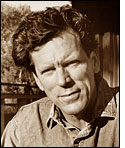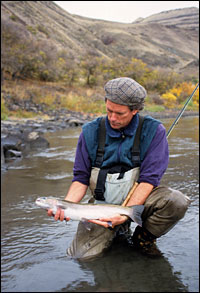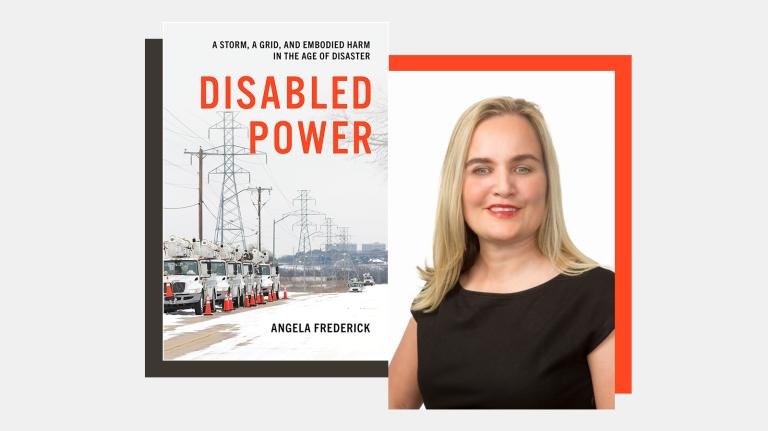
David James Duncan.
What work do you do?
I’m an author and essayist, a fly fisher and river guardian, a public speaker, and, compared to a lot of people, a contemplative.
How does it relate to the environment?
I’ve been breathing and drinking water and eating food and chasing fish all my life. I’ve tried to resist the industrial world’s blights all my life. I have sensed the presence of benign forces, perhaps even invisible beings, all my life. The result has been a lot of gratitude that’s found its way into my books. This, in turn, has earned a lot of money for NGOs, including the Sierra Club, Save Our Wild Salmon, the Triad Institute, and others.
What are you working on at the moment?
Two novels — one about eros, one about reincarnation — both set in the West. I’m also involved in the ongoing campaign to remove four Lower Snake River dams that are driving wild salmon from 5,500 miles of pristine Western streams forever. I write essays and memoir as the spirit and necessity move me. I’m raising a family. I’m enjoying a marriage.
How do you get to work?
I get up, trudge down to the kitchen, make a quadruple espresso, take it out the front door, walk 30 steps to the back side of the garage, scratch the nose of our horse, Rosie, and Rosie licks my hand in return. Then I trudge upstairs to my study on top of the garage, and set to work. My wife, Adrian, a sculptor, steps out the same door and walks 40 steps across the driveway to her studio. But it’s a genuine commute. Once we’re ensconced in our work, we hardly see each other all day, though we’re not 50 feet apart. You’ve got to be darned focused to make a living in the arts.
What long and winding road led you to your current position?
In my teens, I became obsessed with finding a way to make a living that might serve others. I considered farming, various crafts, music, and being a fishing guide. As an 18-year-old hippie, I got strangely good at golf and thought about trying to be the first person to win the Masters wearing nothing but overalls, with a ponytail to my butt. I imagined I’d point out, as I donned the green jacket, that golf was invented in cow pastures by destitute Scots, and that a return to low-income golf would revolutionize the game. I would then begin to lead that revolution. It could’ve been a great life, that hippie golfing life! The makers of polyester would have wanted to assassinate me!
But in India, when I was 20, I had an intuition that my life’s work would be storytelling, decided to try to write a novel, and at 28, finally did. That book, The River Why, let me start eking out a living doing work I loved. I’ve been pretty happy ever since.
Where were you born? Where do you live now?
I was born east of Portland, Ore., within view of the Columbia River near the mouth of the Columbia Gorge. I now live outside Missoula, Mont., in the highest headwaters of the same river, on a trout stream.
What’s been the worst moment of your professional life to date?
It’s a tie between two moments: the day I lost 12 short stories to the implosion of a computer and the day the Supreme Court appointed King George the Bush.
What’s been the best?
To me, it’s a great day every time I receive a letter from somebody who climbed inside one of my books, inhabited it for a while, learned a little something, and emerged grateful. In this sense, I have honestly had thousands of great days.
What environmental offense has infuriated you the most?
The U.S. destruction, at the end of the first Gulf War, of Iraq’s 1,400 water-supply and sewage-treatment plants. Our Defense Intelligence Agency predicted, in 1991 studies declassified in 2001, that this destruction would lead to epidemic disease, especially among children. Knowing this, the [George H.W.] Bush administration destroyed Iraq’s clean water anyway. Three hundred thousand tons of raw sewage began to flow daily into rivers. Sanctions on chlorine and medicine were then put in place, guaranteeing maximum casualties. DIA documents went on to describe epidemic outbreaks of diarrhea, dysentery, respiratory ailments, measles, diphtheria, meningitis, and hepatitis B. They describe a refugee camp in which four-fifths of the population came down with such diseases, killing them by the thousands. Eighty percent of the dead were children. A now-world-famous UNICEF study estimates that 500,000 Iraqi children aged five and under died as a result of the sanctions and fouled water between 1992 and 2000. That’s one-twelfth of a Nazi Holocaust, unleashed mostly upon children, by us, our tax dollars. “Fury” is the wrong word. “Heartbroken for life” are the words.
Who is your environmental hero?
The word “environmental,” I’m sorry, is not big or lovely enough to describe my heroes. Say it aloud. Environment. Hear the technoid ring? If Genesis began, “In the beginning, God created the environment” instead of “the heavens and the earth,” the Bible would be out of print. The word’s lack of musicality prevents those who lack tin ears from rallying around “the environment” with sufficient love and passion. What we seek to defend is a holiness.
That said, a few of my Earth-is-holy heroes are Lao Tzu, St. Francis, Buddha, Jesus, Muhammad, Rumi, Ikkyu, Meister Eckhart, Bach, Chief Joseph and a ton of other Indians, the Beguine saints, the Dalai Lama and exiled Tibetans in general, John Muir, Henry David Thoreau, Mahatma Gandhi, Martin Luther King, Dorothy Day, César Chávez, Rachel Carson, Mother Teresa, Wendell Berry, Gary Snyder, Mary Oliver, Terry Tempest Williams, Bono, Kathy Kelly, Gerri Haynes, Wangari Maathai, Pattiann Rogers, and Jane Hirshfield. I like it that Wangari worships trees as I do, Jane loves border collies as I do, Pattiann loves Bazooka bubblegum as I do, and all three lead lives based on an abiding love for what is nurturing and real — and holy.
Sorry to harp, but there is a soullessness to the word “environmental” that lets even crappy preachers run roughshod over it. I cherish men and women who live as if the statements “The kingdom of heaven is within you,” and “Hate ceases by love,” and “Worship God as though you see Him” are true. And are these words by Jesus, Buddha, and Muhammad “environmental statements”? Not really. They’re much more. Those of us engaged in the earth’s battle for survival need deeper, higher, more lovable descriptions of our daily efforts. The “environmental movement” is a caterpillar in the process of being transformed into a much more beautiful butterfly. It’s time to let the e-word go and find a butterfly of a word.
What’s your environmental vice?
That word again! Shite! But there’s a vice. I curse a lot. When your nation’s “leadership” kills children as policy, when your Congress gives extra power to a buffoon like Bush, when the heads of the EPA suck canal water up their asses with a soda straw, cursing is venting and venting is a sound yogic practice. Prevents tumors. So I’m not apologizing.
How do you spend your free time if you have any? Read any good books lately?
I walk on and in rivers maybe 150 times a year, sometimes fly fishing, mostly just walking and looking. I play music more days than not — piano, tin whistle, and dulcimer. I love to write letters — not emails, but real ink-and-paper letters — swapping yarns and insights with a wide array of souls. Letters, for me, are akin to but way better than church. I could, in a week, put together a 500-page book of gorgeous letters I’ve received that might start a paper-letter-writing renaissance. But I’m having too much fun reading and writing them to stop and make the book. After I’m dead, maybe.
Good books I’ve read lately? William Kittredge’s The Willow Field. Jane Hirshfield’s After. Camille Helminski’s The Book of Nature. Paul Hawken’s Blessed Unrest. Paul’s book is about the largest social movement in human history, which is rising up right now, in opposition to the powers of the WTO, the neocons, the World Bank, and the “free-market fundamentalists.” The resistance has taken the form of hundreds of thousands of NGOs dedicated to conservation, human rights, indigenous rights, life, and health before profit. Many books describe the world in ways that break our hearts. Paul’s book invokes a heartbreak from which light is pouring. He’s a great storyteller, poetic or hard-minded as the case requires. The book moves from a litany of “free market” abuses and WTO crimes against the earth and humanity to the countless life-saving actions of literally millions of altruists now enveloping the earth and uniting in response. It gave me chills. Read it and rejoice.
Which stereotype about environmentalists most fits you?
My knee-jerk protests run toward the stereotypical: “WTO, drop dead!” “Neocons, get your heads out!” “Love thine enemies, do good to those who hate you: vote Republican!”
What’s your favorite place?

Melting into the Eternal Now on the Snake River.
Photo: Steve Pettit
I like those moments — wherever they happen to occur — when I melt into the Eternal Now. Sometimes it happens in pristine wilds, but sometimes it happens in airports or city streets. And who cares which? Yeats said, “There is another world, but it is in this one.” My experience exactly. There is horror in this world, cause for grief without end. But when we pay keen attention and live with compassion, we sometimes fall into a beautiful place inside the apparent place. You know when you’ve entered, because you suddenly feel loved — intimately, totally, unconditionally — though there is no one and nothing there to show it. That’s it. That’s my favorite place.
If you could institute by fiat one environmental reform, what would it be?
Instituting by fiat is a neocon-type game. Screw that. I’m happy to be a pissant. Nature’s power rises up from below, inexorable as karma. As Jim Dodge says, Nature bats last.
If you could have every InterActivist reader do one thing, what would it be?
Keep trying. Keep serving. Worrying is praying for what you don’t want. Keep trying to feel grateful for what is beautiful, even as you’re trying to change what is deadly.
If you can’t change what is deadly, bitch — as eloquently and lovingly and effectively as you can. But then: listen! Then take the time to renew your peace, enjoy having five senses, watch the clouds move, until you feel your inner being return to gratitude — the basic daily stance of all those who realize we did not create ourselves. You’ll win some, you’ll lose some, but above or beyond or within all of those efforts, you might now and then enter a mysterious clearing (if it hasn’t happened already) and suddenly feel loved.


